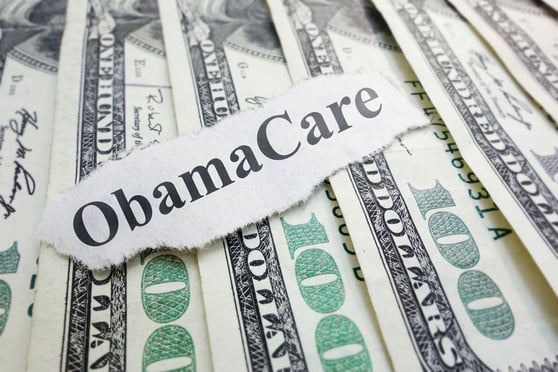The consumer-directed health care benefits community receivedsome unwelcome news from the Internal Revenue Service recently,when the agency announced its intention to impose a fee on healthreimbursement arrangements beginning in 2013.
|The fee is yet another of the many provisions of the PatientProtection and Affordable Care Act that flew under the radar duringits passage as other provisions of the bill received much morepublic scrutiny. And, as with many provisions of PPACA, what thisprovision will do in practice may not have been exactly whatPPACA’s supporters had in mind.
|In short, PPACA created the Patient-Centered Outcomes ResearchInstitute, a quasi-governmental think tank devoted to evaluatingthe relative effectiveness of various medical treatments andprocedures. The theory is that the PCORI will discover ways to makehealth care less expensive. Ironically, this will be accomplishedby making health plans more expensive: Plans must pay a $1 perparticipant fee to the federal government to fund the Institute.This fee may increase to $2 or more per participant in lateryears.
|PPACA imposes this fee on insured plans as well as “self-insuredhealth plans.” Even though it is probably fair to say that PPACAsupporters did not have HRAs specifically in mind with regard tothis particular provision, IRS has determined that a reasonablestatutory interpretation brings HRAs under the “self-insured healthplans” umbrella, since HRAs are, after all, health plans funded byemployers. At present, the fee is scheduled to become effective forpolicy and plan years ending on or after Oct. 1, 2012. IRS plans torevise its Form 720 to reflect these rules.
|Is there any good news? Some. For one thing, plan sponsors willonly have to count employee-participants as “participants” for thepurpose of calculating the HRA fee rather than all personsbenefitting from the plan. In contrast, typical insurance plans arerequired to count everyone under the plan. Thus, a family of fourcovered under an insurance plan would result in a $4 fee ($1 x fourparticipants) while the same family covered by an HRA would resultin only a $1 fee ($1 x the employee-participant only).
|For another, IRS will not impose the fee on HRAs which areintegrated with another self-insured plan (such as a self-insuredin-house health plan) offered by the same plan sponsor, since thiswould result in a “double-payment” of the fee. Unfortunately, thisexception does not apply to HRAs offered to employees inconjunction with typical insurance plans (what are often referredto as “integrated HRAs”) because—according to the IRS—PPACA’sstatutory structure treats insured plans and self-insured plansseparately.
|One last piece of good news: These are proposed regulationsonly, which means that IRS will be taking public comments beforethey become absolutely final. Our partners and clients are stronglyencouraged to submit their comments electronically through theFederal eRulemaking Portal at www.regulations.gov. Be sure toreference IRS REG-136008-11. Written or electronic comments must bereceived by July 16.
|Here are a few important guidelines when commenting:
|Be respectful. This is not an “IRS fee.” Thisis a fee created by the health care reform law which the IRS isrequired by the law to enforce. They are just doing their job.
|Acknowledge IRS’ previous accommodations. Besure to thank IRS for the accommodations it has already made withregard to HRAs.
|Don’t criticize the health care reform law.Save those criticisms for the politicians who brought the law intoexistence. As stated above, this is something IRS is required to dounder the law. In that sense, IRS is as burdened by it as all of usare.
|Don’t just be “anti-tax.” For obvious reasons,IRS isn’t particularly interested in complaints about taxes ingeneral (e.g., “Taxes are already too high!” etc.) Again, save thatfor the politicians. Focus instead on the particular problemscreated by this particular fee on HRAs.
|Offer a reasonable solution/compromise.Contrary to what many believe, the IRS is usually quite open toideas from the public so long as those ideas are reasonable andcompliant with the relevant statutory language.
|Working together, perhaps those of us in the consumer-directedhealth care community can get some relief from yet anotherunpleasant PPACA surprise.
Complete your profile to continue reading and get FREE access to BenefitsPRO, part of your ALM digital membership.
Your access to unlimited BenefitsPRO content isn’t changing.
Once you are an ALM digital member, you’ll receive:
- Critical BenefitsPRO information including cutting edge post-reform success strategies, access to educational webcasts and videos, resources from industry leaders, and informative Newsletters.
- Exclusive discounts on ALM, BenefitsPRO magazine and BenefitsPRO.com events
- Access to other award-winning ALM websites including ThinkAdvisor.com and Law.com
Already have an account? Sign In
© 2024 ALM Global, LLC, All Rights Reserved. Request academic re-use from www.copyright.com. All other uses, submit a request to [email protected]. For more information visit Asset & Logo Licensing.








